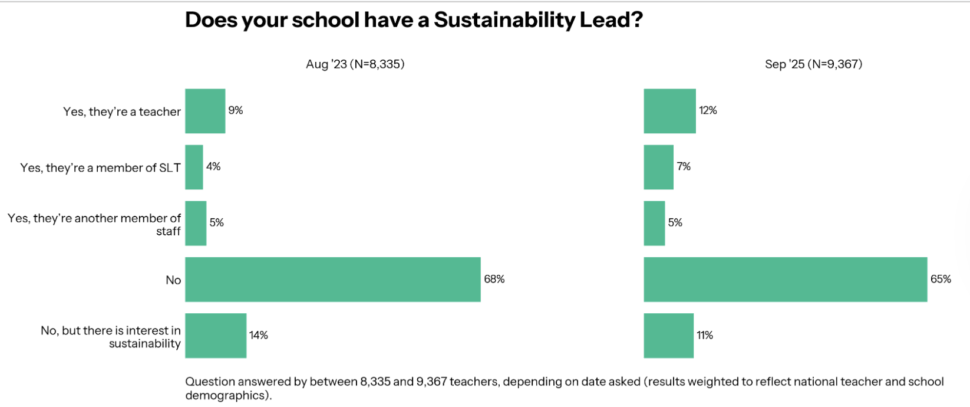Two-thirds of schools do not have a sustainability lead as required by new climate change rules, a poll of teachers suggests. Unions say the wider strategy is now under review.
The Conservative government’s climate change strategy, first published in 2022, set out requirements for every school to nominate a sustainability lead from this month. They were to be responsible for developing a climate school change plan.
Since Labour won power, however, little has been said about the plan. And a new survey shows that progress has been limited.
Nearly two-thirds of respondents to a Teacher Tapp poll this month said their school did not have someone in the sustainability lead role. This proportion has not shifted much since 2023, when the number was 68 per cent.

Just 24 per cent said they were aware that their school had a sustainability lead, up from 18 per cent two years ago.
Emma Harrison, business leadership specialist at ASCL, said schools were facing a “staff recruitment and retention crisis” which “may be why there’s a gap in appointed nominated sustainability leads”.
But she added that the wider strategy was “currently under review and we await to see how expectations on schools shift as we head towards 2026 and beyond.
“It’s important that schools and colleges are supported with the funding they need to meet these responsibilities.”
Policy delivery ‘inconsistent’
The Conservative government’s sustainability and climate change strategy made wide-ranging pledges for schools in 2022.
As well as sustainability leads and climate plans, this included a new natural history GCSE by 2025. Schools were required to report their carbon emissions by 2024, and an annual climate literacy survey was introduced to understand progress among school leavers.
Once appointed, sustainability leads would receive carbon literacy training, which would help them to develop a climate action plan for their setting.
But a report from the Ovo Foundation in September 2024 found the delivery of the policy had been “inconsistent”.
“The remit for these leads is very broad, ranging from operational functions such as monitoring energy/water use and reducing carbon emissions to more educational purposes,” the report states.
“In some schools, sustainability leads are given adequate time and resources to carry out this additional role properly, whereas in other schools people are nominated to do the role alongside other competing demands, so they are less able to be effective.”
‘Surprised, but not surprised’
Henry Greenwood, from the Green Schools Project, said he was “surprised, but not surprised” at the polling.

Greenwood, who delivers teacher training on climate change in schools, added: “One thing I like to do is ask teachers if they know the DfE has a strategy. Sometimes I get no hands up at all.
“Quite often, I get one or two hands up, which is normally the person leading on our programme, who is likely to be the sustainability lead.”
He estimated that around 10 to 15 per cent of schools are “keen and interested” in tackling climate change, while there’s a “big proportion of schools that just aren’t doing very much”.
But Alex Green, from Let’s Go Zero, said there may be “many schools where the individual doing the survey doesn’t know they have a sustainability lead, or doesn’t know who it is”.

He said leaders were “trying really hard and battling in amongst all the other things they have to do”. But “enthusiasm and demand for a sustainability plan of action is increasing at an extraordinary place”.
Strategy update
Natalie Highfield, senior equalities officer for school leaders’ union NAHT, said leaders were committed to delivering sustainability as “a core part of their school culture”, but government support “is lacking and funding is very limited”.

“It’s unsurprising that schools have not been able to fully engage with the strategy, among all the competing priorities they have to juggle,” she added.
A Department for Education blog published in January said the Labour government’s climate strategy was “preparing schools for the climate issues we face”.
It reiterated that they “hope to have all schools implementing their own climate action plans by 2025”.
Government guidance, last updated in March this year, still sets out that sustainability leads as a requirement. However, the January blog did state that the strategy was being “updated”.
The DfE did not respond to a request for comment.
















The whole policy should be scrapped. The issue can be taught in geography.
Lots of huge corporations pulling out of their commitment to net zero as they realise the weight of public feeling is not there.
Schools have plenty of other immediate concerns they need to sort out.